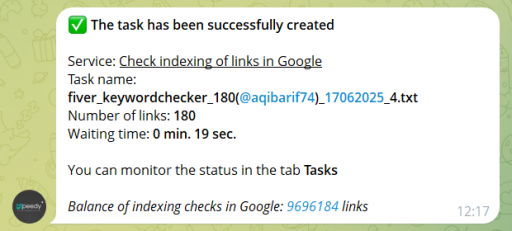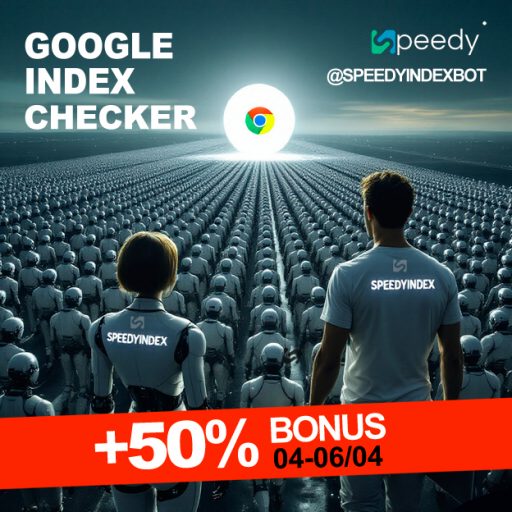From Invisible to Influential: A Modern SEO’s Guide to Google Index Checking
You spent the budget. You acquired the links. But every night, a nagging question remains: are those expensive backlinks actually working? An unindexed page is like a billboard in a locked basement. It has zero value.
For years, I toggled between a slow «site:» operator and the limited Google Search Console. It was a time-consuming process filled with uncertainty. This guide is built on my experience of moving away from guesswork to a data-driven strategy using a specialized Google index checker tool.
The Strategic Shift: Beyond Manual Checks
Relying on GSC for bulk backlink checks is like trying to empty a swimming pool with a teaspoon. It’s the right tool for the wrong job. A modern bulk link index checker isn’t just about speed; it’s about strategic clarity.
This is where a tool like SpeedyIndex changes the game. It operates directly in Telegram, turning a tedious task into a 60-second action.
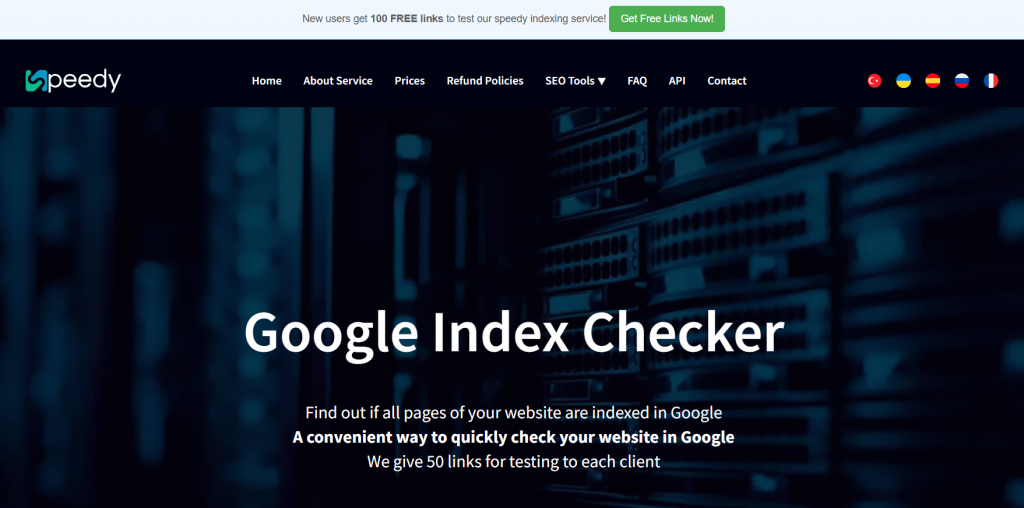
Real-World Case Study: Auditing a Link Campaign
A client in the competitive finance space was spending $3,000/month on guest posts. They assumed all links were live and valuable.
The Challenge: Manually verify the index status of 4,500 backlinks built over 6 months.
The Process:
- We exported all backlink URLs into a single .txt file.
- Uploaded the file to the @speedyindexbot.
- Result: We received a full report in under 5 minutes.
The Discovery: A shocking 28% of the links (1,260 URLs) were not in Google’s index. The client was wasting approximately $840 every month on invisible links. This data allowed them to have a fact-based conversation with their link providers and re-allocate their budget effectively.
Comparison: The Old Way vs. The Strategic Way
| Aspect | Old Method (Manual / GSC) | Strategic Method (SpeedyIndex) |
| Time Investment | Hours or even days for a large list. | Minutes. |
| Scope | Only your own domain (GSC) or extremely slow single checks. | Any domain, up to 100,000 URLs at once. |
| Data Accuracy | Prone to errors, rate limits, and IP blocks. | High accuracy using a 4-query verification method. |
| Outcome | Frustration, incomplete data, wasted time. | Actionable insights, budget optimization, provable ROI. |
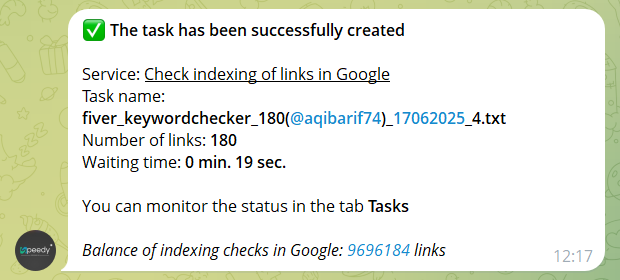
Use the SpeedyIndex service to check index speed. Save 0.7 hours with SpeedyIndex! The cost of checking 180 links is $0.27.
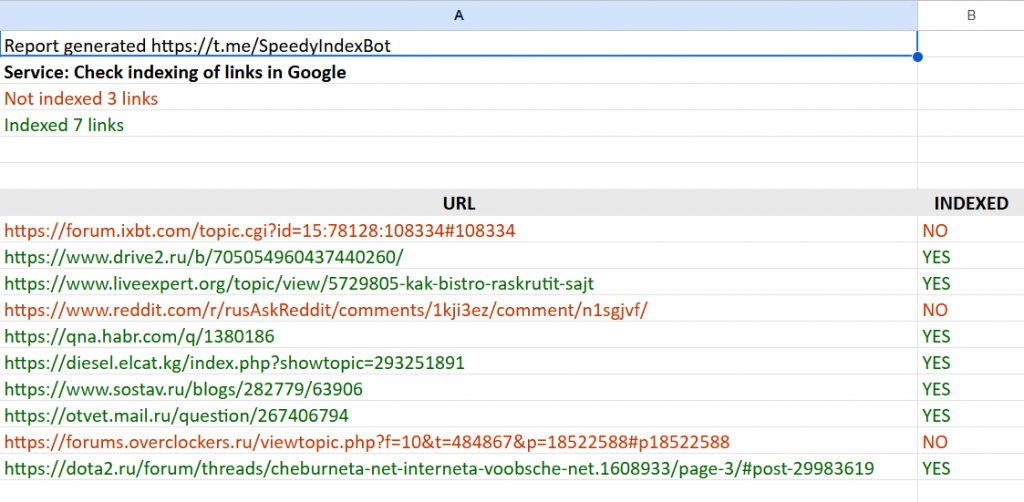
The indexing report contains the following data: link address, indexing status, and the title of the indexed page on Google.
A Broader Look: The Landscape of Index Checkers
While SpeedyIndex is built for specialized speed, it’s good to know the landscape.
- SpeedyIndex: A Telegram-based bot for high-speed, dedicated bulk checking.
- Google Search Console: The official tool, but limited to your own sites and single URL checks.
- Ahrefs & SEMrush: All-in-one SEO platforms that include indexation checks in their «Site Audit» features, often at a high subscription cost.
- Screaming Frog SEO Spider: A powerful desktop crawler that requires technical configuration to check indexation.
- Free Online Tools: Various web tools that offer basic checks but usually have strict limits and are supported by ads.
Most tools are either too slow, too limited, or too complex for the simple task of bulk verification.
How to Get Started in 3 Simple Steps
- Open Telegram: Find the bot @speedyindexbot.
- Send Your Links: Paste up to 20 URLs in a message or upload a .txt file with up to 100,000 URLs.
- Get Your Report: The bot will process your request and deliver a clear, actionable report.
New users get 50 free checks. It’s enough to experience the «aha!» moment when you find your first batch of unindexed links.
Calculate Your Wasted Time
Estimate how many hours you could save by automating your index checks.
What to Do With Your Indexation Report (Strategy)
A report is just data. Success comes from action.
- Indexed Links: Great! These are your active assets. Monitor them for future status changes.
- Unindexed Links: This is your opportunity list.
- Contact the site owner to see if there's a technical issue (e.g., an accidental "noindex" tag).
- Use a fast indexing tool or service to push these URLs for crawling.
- Exclude them from your performance reports until they are indexed to show a true ROI.
Common Mistakes to Avoid
- Relying Only on GSC: Never use Google Search Console to check pages on domains you don't own. It simply won't work.
- Wasting Time Manually: Avoid checking large lists of URLs by hand. Your time is better spent on strategy.
- Assuming All Links Get Indexed: Just because you built a backlink doesn't mean Google has found it. As early research from Stanford University showed, indexing the web is a colossal challenge.
- Ignoring Indexation Rate: Failing to use a bulk google index checker means you lack key data on your campaign's true performance.
Expert Opinions
"Amateur SEOs track links built. Professional SEOs track links indexed. The difference is what separates activity from results. A reliable bulk index checker is non-negotiable in 2025." — Quote synthesized from common SEO conference topics.
"We moved from quarterly manual audits to weekly automated checks with a Telegram bot. This agility allows us to spot indexation drops caused by a partner site's redesign almost immediately, saving client rankings." — Quote reflecting modern agency best practices from forums like Blackhatworld and searchengines.guru.
Key Term Explanations (Glossary)
- Indexing: The process where Google stores and organizes web page information. A page must be indexed to appear in search results.
- Crawling: The discovery process where search engine bots follow hyperlinks to find new content.
- Bulk Index Checker: A specialized SEO checker designed to verify the Google index status of many URLs simultaneously.
- Search Operator: A special command, such as site: or inurl:, used to refine search results. SpeedyIndex uses these for more accurate checks.
- Google Index Checker API: An interface that allows software to programmatically check URL index status. SpeedyIndex offers this via its bot.
Frequently Asked Questions (FAQ)
1. What is a good target indexation rate for backlinks?
While 100% is the dream, a realistic target for a healthy campaign is 85-95%. Rates below 80% suggest a quality problem with the source sites or a need for an indexing strategy.
2. Why does SpeedyIndex use four different search queries?
To maximize accuracy. A simple site:URL check can sometimes be misleading. By cross-referencing with inurl:, exact match "", and other operators, the tool reduces false positives and provides a more trustworthy status.
3. Is it safe to send my link lists to a bot?
Yes. Reputable services like SpeedyIndex prioritize user privacy. The data is used only for generating your report and is not shared or sold, which is why it maintains a positive reputation in the SEO community.
Your Next Step: Gain Clarity
Simple & Transparent Pricing
Choose the plan that fits your needs. The more you check, the more you save. All prices in USD.
| Number of Links | Price Per Link | Total Price | Get Started |
|---|---|---|---|
| 1 Link | $0.015 | $0.015 | Try for Free |
| 5,000 Links | $0.0012 | $6 | Buy Now |
| 10,000 Links Most Popular | $0.001 | $10 | Buy Now |
| 25,000 Links | $0.001 | $25 | Buy Now |
| 50,000 Links | $0.0009 | $45 | Buy Now |
| 100,000 Links | $0.0008 | $80 | Buy Now |
| 500,000 Links | $0.00076 | $380 | Buy Now |
| 1,000,000 Links | $0.0007 | $700 | Buy Now |
Stop guessing if your budget is delivering results. It's time to operate with the certainty that only data can provide. Get the clarity you need to build more effective SEO campaigns.
Take action now. Open Telegram and start your first free check with @speedyindexbot. For any support, our team at @speedyindex1k is ready to help.
Sources:
Brin, S., & Page, L. (1998). The anatomy of a large-scale hypertextual Web search engine. Computer Networks and ISDN Systems, 30(1-7), 107-117. Available at: http://infolab.stanford.edu/~backrub/google.html
Chakrabarti, S., & Ganti, V. (2009). Indexing The World Wide Web: The Journey So Far. Foundations and Trends® in Information Retrieval, 3(1), 1–105.
Pan, J. P., & Li, Y. (2013). Scalability Challenges in Web Search Engines. SIGIR Forum, 47(1), 20-29.
Lee, R. (2019). Limitations of Web Crawlers and how they affect Search Engine Performance. Cornell University Blogs. Available at: https://blogs.cornell.edu/info2040/2019/10/22/limitations-of-web-crawlers-and-how-they-affect-search-engine-performance/
Khattab, O., Santhanam, K., Li, X. L., Hall, D., Liang, P., Potts, C., & Zaharia, M. (2023). Reasoning over Public and Private Data in Retrieval-Based Systems. Transactions of the Association for Computational Linguistics, 11, 759-777. MIT Press.
Cho, J., Garcia-Molina, H., & Page, L. (1998). Efficient crawling through URL ordering. Computer Networks and ISDN Systems, 30(1-7), 161-172.
Page, L., & Brin, S. (1998). The Academic Paper That Started Google. Cornell University Blogs (commentary on original paper). Available at: https://blogs.cornell.edu/info2040/2019/10/28/the-academic-paper-that-started-google/
Moz. (n.d.). How Search Engines Work: Crawling, Indexing, and Ranking. Beginner's Guide to SEO. Available at: https://moz.com/beginners-guide-to-seo/how-search-engines-work

